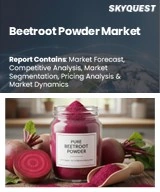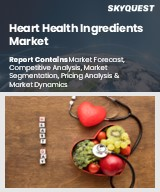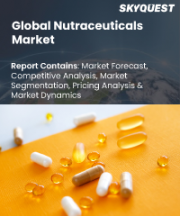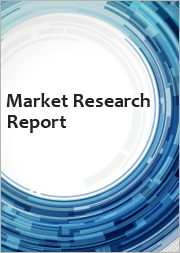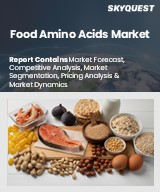
|
시장보고서
상품코드
1736685
뉴트라슈티컬 시장 : 제품 유형별, 형태별, 용도별, 지역별(2026-2032년)Nutraceutical Market by Product Type, Form, Application, & Region for 2026-2032 |
||||||
뉴트라슈티컬 시장 평가(2026-2032년)
생활습관병을 관리하기 위해 예방적 의료 솔루션과 영양 보충제를 찾는 소비자의 건강 인식이 높아지면서 영양제 시장을 이끄는 주요 요인으로 작용하고 있습니다. 2024년 3,842억 7,000만 달러의 매출을 기록한 영양제 시장은 2032년 4,537억 8,000만 달러에 달할 것으로 추정됩니다.
기술 및 연구의 발전으로 혁신적인 영양제 처방이 생겨나면서 시장은 2026-2032년 연평균 복합 성장률(CAGR) 2.10%를 보일 것으로 예측됩니다.
뉴트라슈티컬 시장 정의/개요
뉴트라슈티컬(Nutraceuticals)은 기본적인 영양 이상의 건강 효과를 가져다주는 식품으로 정의되며, 건강 유지와 질병 예방에 사용되는 경우가 많습니다. '영양'과 '의약품'을 합친 이 용어에는 영양보충식품, 기능성 식품, 한약 등 다양한 제품이 포함됩니다.
영양제는 생리적 이점과 만성 질환으로부터의 보호를 제공하는 것으로 여겨지며, 건강 증진, 노화 지연, 신체 구조 및 기능 강화에 활용될 수 있습니다. 뉴트라슈티컬은 식품에서 유래한 것이지만, 일반적으로 의약품과 유사한 형태로 판매되고 있으며, 의약품과 같은 엄격한 과학적 검증을 거치지 않았을 가능성이 있습니다. 뉴트라슈티컬의 규제적 위치는 국가마다 다르며, 일부 국가에서는 의약품이 아닌 식품이나 건강보조식품으로 취급하는 경우도 있습니다.
고령화는 영양식 시장 성장에 어떤 역할을 할 것인가?
2030년까지 전 세계 인구 6명 중 1명이 60세 이상이 될 것으로 예상되는 고령화 사회는 영양제 시장의 중요한 성장 동력으로 인식되고 있으며, 이 인구층에 맞는 건강 중심 솔루션의 필요성을 강조하고 있습니다. 고령화가 진행됨에 따라 노화 관련 질병 예방에 대한 관심이 높아지면서 관절 건강, 인지 기능, 심혈관 건강을 증진하는 건강기능식품 및 기능성 식품에 대한 수요가 증가하고 있습니다.
정부 통계에 따르면, 만성질환과 관련된 의료비용이 증가하고 있으며, 노인들이 뉴트라슈티컬을 통해 예방적 의료대책을 채택하도록 촉구하고 있습니다.
또한, 연구에 따르면 노인들이 일상 생활에 건강기능식품을 도입하는 것을 점점 더 많이 권장하고 있어 이 분야의 성장 여지가 더욱 커지고 있습니다. 영양제 섭취를 통해 건강 유지와 질병 예방을 우선시하는 사람들이 늘어남에 따라 이러한 인구 통계학적 변화는 시장 동향에 지속적으로 영향을 미칠 것으로 예측됩니다.
뉴트라슈티컬 시장의 품질 관리 및 표준화와 관련된 주요 과제는?
품질 관리와 표준화는 주로 의약품에 비해 엄격한 규제 기준이 없기 때문에 영양보충제 시장의 주요 과제입니다. 소비자의 약 70%가 건강기능식품의 품질과 안전성에 대해 우려를 표명하고 있는 것으로 보고되고 있으며, 이는 강력한 품질 보증 조치의 필요성을 강조하고 있습니다. 성분의 자연적 편차는 종종 배치 간 불일치를 초래하여 제품의 효능을 떨어뜨리고 소비자의 신뢰를 떨어뜨릴 수 있습니다.
정부 통계에 따르면, 많은 제조업체들이 우수의약품제조관리기준(GMP)을 준수하지 않아 제조 중 오염 및 품질 문제의 위험을 초래하고 있다고 합니다. 그 결과, 높은 품질 기준을 유지해야 하는 책임은 엄격한 검사 프로토콜을 시행하고 제조 공정 전반에 걸쳐 추적성을 보장해야 하는 개별 제조업체에게 점점 더 큰 책임이 주어지고 있습니다. 품질에 대한 보편적으로 인정되는 벤치마크가 없기 때문에 뉴트라슈티컬 업계는 제품의 신뢰성과 소비자 안전을 보장하는 데 있어 큰 과제를 안고 있습니다.
목차
제1장 세계의 뉴트라슈티컬 시장 : 서론
- 시장 개요
- 분석 범위
- 전제조건
제2장 주요 요약
제3장 VERIFIED MARKET RESEARCH의 분석 방법
- 데이터 마이닝
- 밸리데이션
- 1차 자료
- 데이터 소스 리스트
제4장 세계의 뉴트라슈티컬 시장 전망
- 개요
- 시장 역학
- 성장 촉진요인
- 성장 억제요인
- 기회
- Porter's Five Forces 모델
- 밸류체인 분석
제5장 세계의 뉴트라슈티컬 시장 : 제품 유형별
- 개요
- 식이보충제
- 기능성 식품
- 의료용 영양
- 기능성 음료
제6장 세계의 뉴트라슈티컬 시장 : 형태별
- 개요
- 정제
- 분말
- 액체
- 구미
제7장 세계의 뉴트라슈티컬 시장 : 용도별
- 개요
- 예방 의료
- 질병 관리
- 체중 관리
- 안티에이징
제8장 세계의 뉴트라슈티컬 시장 : 지역별
- 개요
- 북미
- 미국
- 캐나다
- 멕시코
- 유럽
- 독일
- 영국
- 프랑스
- 기타 유럽
- 아시아태평양
- 중국
- 일본
- 인도
- 기타 아시아태평양
- 기타 지역(ROW)
- 라틴아메리카
- 중동 및 아프리카
제9장 세계의 뉴트라슈티컬 시장 경쟁 구도
- 개요
- 기업의 시장 순위
- 주요 발전 전략
제10장 기업 개요
- Pfizer Inc.
- Nestle Health Science S.A.
- Amway Corporation
- Herbalife Nutrition Ltd.
- DSM
- The Hain Celestial Group, Inc.
- Abbott Laboratories
- Danone S.A.
- Sun Pharmaceutical Industries Ltd.
- NutraLife Corporation
제11장 부록
- 관련 분석
Nutraceutical Market Valuation - 2026-2032
The increasing health consciousness among consumers, who are more inclined to seek preventive healthcare solutions and dietary supplements to manage lifestyle-related disorders are the primary factor driving the nutraceutical market. The Nutraceutical Market is estimated to reach a valuation of USD 453.78 Billion by 2032 over the forecast by subjugating the revenue of USD 384.27 Billion valued in 2024.
Advancements in technology and research have led to innovative nutraceutical formulations, enabling the market to grow at a CAGR of 2.10% from 2026 to 2032.
Nutraceutical Market: Definition/ Overview
A nutraceutical is defined as a food product that provides health benefits beyond basic nutrition, often used to maintain health and prevent illness. The term, which combines "nutrition" and "pharmaceutical," encompasses a wide range of products, including dietary supplements, functional foods, and herbal remedies.
Nutraceuticals are believed to offer physiological benefits or protection against chronic diseases and can be utilized to improve health, delay aging, and enhance the body's structure or function. While they are derived from food sources, nutraceuticals are typically marketed in forms resembling medicinal products and may not have undergone the same rigorous scientific validation as pharmaceuticals. The regulatory status of nutraceuticals varies by country, with some jurisdictions treating them as foods or dietary supplements rather than drugs.
What Role does the Aging Population Play in Driving the Growth of the Nutraceutical Market?
The aging population is recognized as a significant driver of growth in the nutraceutical market, as an increasing number of individuals over the age of 65 are seeking products that support their health and well-being. It has been reported that by 2030, one in six people worldwide will be aged 60 years or older, highlighting the urgency for health-focused solutions tailored to this demographic. As people age, there is a heightened emphasis on preventing age-related diseases, leading to a greater demand for dietary supplements and functional foods that promote joint health, cognitive function, and cardiovascular wellness.
Government statistics indicate that healthcare costs associated with chronic diseases are rising, prompting older adults to adopt preventive healthcare measures through nutraceuticals.
Additionally, studies have shown that older adults are increasingly recommended to incorporate dietary supplements into their daily routines, further boosting the scope for growth in this sector. This demographic shift is expected to continue influencing market trends as more individuals prioritize health maintenance and disease prevention through nutraceutical consumption.
What are the Main Challenges Related to Quality Control and Standardization in the Nutraceutical Market?
Quality control and standardization are major challenges in the nutraceutical market, primarily due to the lack of stringent regulatory standards compared to pharmaceuticals. It has been reported that approximately 70% of consumers express concerns regarding the quality and safety of dietary supplements, which underscores the necessity for robust quality assurance measures. The natural variability of ingredients often results in batch-to-batch inconsistencies, potentially compromising product efficacy and eroding consumer trust.
Government statistics highlight that many manufacturers fail to adhere to Good Manufacturing Practices (GMP), leading to risks of contamination and quality issues during production. As a result, the responsibility for maintaining high-quality standards increasingly falls on individual manufacturers, who must implement rigorous testing protocols and ensure traceability throughout the production process. Without universally accepted benchmarks for quality, significant challenges persist in ensuring product reliability and consumer safety within the nutraceutical industry.
Category-Wise Acumens
How do Consumer Preferences for Natural Health Solutions Contribute to the Dominance of Dietary Supplements in the Nutraceutical Market?
Consumer preferences for natural health solutions significantly contribute to the dominance of dietary supplements in the nutraceutical market, as an increasing number of individuals are gravitating towards products perceived as safer and more effective for health maintenance. It has been reported that approximately 70% of consumers express a preference for natural ingredients, particularly for preventive health measures rather than curative ones, indicating a strong inclination towards dietary supplements that promise enhanced well-being without the side effects often associated with synthetic medications.
Government statistics from the Ministry of Food Processing Industries highlight a notable shift in purchasing patterns, with many consumers now favoring immunity-boosting supplements and herbal products over traditional pharmaceuticals for minor health issues. This trend is further supported by a growing awareness of the health benefits associated with dietary supplements, which is reflected in the increasing consumer willingness to invest in products that align with their values of sustainability and natural wellness. As a result, the nutraceutical market is being shaped by these evolving consumer preferences, leading to a robust demand for dietary supplements that cater to the desire for holistic health solutions.
How has the COVID-19 Pandemic Influenced the Emphasis on Preventive Healthcare Within the Nutraceutical Market?
The COVID-19 pandemic has significantly influenced the emphasis on preventive healthcare within the nutraceutical market, as consumers increasingly seek solutions to enhance their immunity and overall health. It has been observed that the demand for dietary supplements surged during the pandemic, with many individuals turning to nutraceuticals as a proactive measure against health threats. Government data from the Food Safety and Standards Authority of India (FSSAI) indicate that there was a notable shift in consumer behavior, with a marked increase in the purchase of immunity-boosting supplements such as vitamins C and D, zinc, and probiotics. Approximately 15% of India's population is reported to be undernourished, highlighting the critical role that nutraceuticals can play in addressing nutritional deficiencies exacerbated by the pandemic.
Furthermore, initiatives such as the National Health Mission have underscored the importance of nutrition in public health policies, thereby reinforcing the relevance of nutraceuticals as essential components of preventive healthcare strategies. As a result, a lasting impact on consumer attitudes towards health and wellness has been established, positioning nutraceuticals as vital tools in promoting preventive care in a post-pandemic world.
What Factors Contribute to North America's Position as a Leader in the Nutraceutical Market?
North America's position as a leader in the global nutraceutical market is influenced by several key factors, primarily driven by consumer demand for health-focused products. It has been reported that approximately 35.2% of the nutraceutical market share is held by this region, reflecting a strong preference for preventive healthcare solutions among consumers. Government statistics from the Centers for Disease Control and Prevention (CDC) indicate that nearly 70% of adults in the U.S. are seeking dietary supplements to enhance their health and prevent chronic diseases. The aging population in North America also plays a crucial role, as older adults increasingly turn to nutraceuticals to manage age-related health issues.
Additionally, rising healthcare costs, which account for about 14% of the U.S. gross national product, have prompted consumers to seek cost-effective preventive measures through dietary supplements and functional foods. Furthermore, regulatory support for functional food innovations and increased research and development efforts by companies are fostering a competitive environment that enhances product availability and consumer trust in nutraceuticals. As a result, these factors collectively contribute to North America's dominant position in the nutraceutical market.
What Factors Contribute to the Rapid Growth of the Nutraceutical Market in Asia Pacific Region?
The rapid growth of the nutraceutical market in the Asia Pacific region is driven by several key factors, primarily related to changing consumer preferences and increasing health awareness. It has been reported that approximately 40% of the demand for nutraceuticals originated from Asia Pacific in 2022, reflecting a strong regional inclination towards preventive healthcare solutions. Government statistics from the World Health Organization indicate that the prevalence of chronic diseases such as diabetes and cardiovascular conditions is rising, prompting consumers to seek dietary supplements to enhance their health and immunity.
Additionally, various government initiatives, including the Poshan Abhiyan in India aimed at eradicating malnutrition, have promoted awareness about the importance of nutrition in disease prevention. Furthermore, the legalization of hemp cultivation in several countries has led to an increase in cannabis-based nutraceutical products, catering to evolving consumer interests. As a result, these factors collectively contribute to the dynamic expansion of the nutraceutical market in the Asia Pacific region, positioning it as a significant player on the global stage.
Competitive Landscape
The competitive landscape of the nutraceutical market is characterized by a mix of established international players and emerging companies, all striving for market share through innovation and strategic initiatives. The rising trend of veganism and clean-label products is influencing product formulations, leading to increased demand for botanical ingredients. With an advanced distribution network supporting these efforts, the competitive dynamics within the nutraceutical market are expected to continue evolving as companies adapt to changing consumer preferences and health trends.
Some of the prominent players operating in the nutraceutical market include:
Pfizer,
Nestle Health Science A.
Amway Corporation
Herbalife Nutrition
DSM
The Hain Celestial Group,
Abbott Laboratories
Danone A.
Sun Pharmaceutical Industries
NutraLife Corporation
Latest Developments
In March 2023, Pfizer announced a definitive merger agreement to acquire Seagen Inc. for USD 43 Billion, aiming to enhance its oncology portfolio and potentially expand into nutraceutical applications that support cancer treatment and overall health.
In February 2023, DSM launched life's(R)OMEGA O3020, a new algal oil product aimed at providing a sustainable alternative to fish oil, addressing consumer demand for plant-based omega-3 fatty acids.
Nutraceutical Market, By Category Product Type:
- Dietary Supplements
- Functional Foods
- Medical Nutrition
- Functional Beverages
- Form:
- Tablets
- Powders
- Liquids
- Gummies
- Application:
- Preventive Healthcare
- Disease Management
- Weight Management
- Anti-Aging
- Region:
- North America
- Europe
- Asia-Pacific
- Latin America
- Middle East & Africa
TABLE OF CONTENTS
1 INTRODUCTION OF GLOBAL NUTRACEUTICAL MARKET
- 1.1 Overview of the Market
- 1.2 Scope of Report
- 1.3 Assumptions
2 EXECUTIVE SUMMARY
3 RESEARCH METHODOLOGY OF VERIFIED MARKET RESEARCH
- 3.1 Data Mining
- 3.2 Validation
- 3.3 Primary Interviews
- 3.4 List of Data Sources
4 GLOBAL NUTRACEUTICAL MARKET OUTLOOK
- 4.1 Overview
- 4.2 Market Dynamics
- 4.2.1 Drivers
- 4.2.2 Restraints
- 4.2.3 Opportunities
- 4.3 Porters Five Force Model
- 4.4 Value Chain Analysis
5 GLOBAL NUTRACEUTICAL MARKET, BY PRODUCT TYPE
- 5.1 Overview
- 5.2 Dietary Supplements
- 5.3 Functional Foods
- 5.4 Medical Nutrition
- 5.5 Functional Beverages
6 GLOBAL NUTRACEUTICAL MARKET, BY FORM
- 6.1 Overview
- 6.2 Tablets
- 6.3 Powders
- 6.4 Liquids
- 6.5 Gummies
7 GLOBAL NUTRACEUTICAL MARKET, BY APPLICATION
- 7.1 Overview
- 7.2 Preventive Healthcare
- 7.3 Disease Management
- 7.4 Weight Management
- 7.5 Anti-Aging
8 GLOBAL NUTRACEUTICAL MARKET, BY GEOGRAPHY
- 8.1 Overview
- 8.2 North America
- 8.2.1 U.S.
- 8.2.2 Canada
- 8.2.3 Mexico
- 8.3 Europe
- 8.3.1 Germany
- 8.3.2 U.K.
- 8.3.3 France
- 8.3.4 Rest of Europe
- 8.4 Asia Pacific
- 8.4.1 China
- 8.4.2 Japan
- 8.4.3 India
- 8.4.4 Rest of Asia Pacific
- 8.5 Rest of the World
- 8.5.1 Latin America
- 8.5.2 Middle East and Africa
9 GLOBAL NUTRACEUTICAL MARKET COMPETITIVE LANDSCAPE
- 9.1 Overview
- 9.2 Company Market Ranking
- 9.3 Key Development Strategies
10 COMPANY PROFILES
- 10.1 Pfizer Inc.
- 10.1.1 Overview
- 10.1.2 Financial Performance
- 10.1.3 Product Outlook
- 10.1.4 Key Developments
- 10.2 Nestle Health Science S.A.
- 10.2.1 Overview
- 10.2.2 Financial Performance
- 10.2.3 Product Outlook
- 10.2.4 Key Developments
- 10.3 Amway Corporation
- 10.3.1 Overview
- 10.3.2 Financial Performance
- 10.3.3 Product Outlook
- 10.3.4 Key Developments
- 10.4 Herbalife Nutrition Ltd.
- 10.4.1 Overview
- 10.4.2 Financial Performance
- 10.4.3 Product Outlook
- 10.4.4 Key Developments
- 10.5 DSM
- 10.5.1 Overview
- 10.5.2 Financial Performance
- 10.5.3 Product Outlook
- 10.5.4 Key Developments
- 10.6 The Hain Celestial Group, Inc.
- 10.6.1 Overview
- 10.6.2 Financial Performance
- 10.6.3 Product Outlook
- 10.6.4 Key Developments
- 10.7 Abbott Laboratories
- 10.7.1 Overview
- 10.7.2 Financial Performance
- 10.7.3 Product Outlook
- 10.7.4 Key Developments
- 10.8 Danone S.A.
- 10.8.1 Overview
- 10.8.2 Financial Performance
- 10.8.3 Product Outlook
- 10.8.4 Key Developments
- 10.9 Sun Pharmaceutical Industries Ltd.
- 10.9.1 Overview
- 10.9.2 Financial Performance
- 10.9.3 Product Outlook
- 10.9.4 Key Developments
- 10.10 NutraLife Corporation
- 10.10.1 Overview
- 10.10.2 Financial Performance
- 10.10.3 Product Outlook
- 10.10.4 Key Developments
11 Appendix
- 11.1 Related Reports






